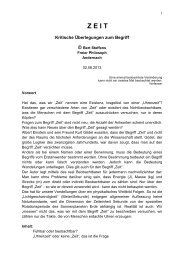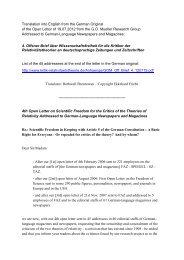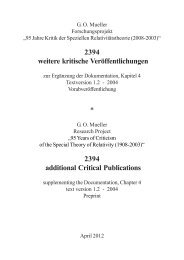1. The Need of New Approaches - Kritische Stimmen zur ...
1. The Need of New Approaches - Kritische Stimmen zur ...
1. The Need of New Approaches - Kritische Stimmen zur ...
You also want an ePaper? Increase the reach of your titles
YUMPU automatically turns print PDFs into web optimized ePapers that Google loves.
2012<br />
Chapter 9: <strong>The</strong> Thought Experiment<br />
677 / 2004-09-21 - Frank SCHIRRMACHER c/o Frankfurter Allgemeine Zeitung. Frankfurt a. M.<br />
CD-ROM <strong>1.</strong>2<br />
678 / 2004-09-25 - Pr<strong>of</strong>. Hans Herbert VON ARNIM c/o Forschungsinstitut für öffentliche,Verwaltung. Speyer.<br />
CD-ROM <strong>1.</strong>2<br />
679 / 2004-09-25 - Pr<strong>of</strong>. Ulrich BECK c/o Institut für Soziologie der Universität München.<br />
CD-ROM <strong>1.</strong>2<br />
Extract:<br />
“If now the press, on the occasion <strong>of</strong> the “Caroline” judgement, has rediscovered its noble self-image as the<br />
“fourth power” and passionately invokes its guardian duties within the democracy, it must first admit to itself and to<br />
the public its shameful role in the suppression <strong>of</strong> criticism <strong>of</strong> the theory, and must give up this role.<br />
If one surveys the development <strong>of</strong> the criticism since the first critical work <strong>of</strong> Max Abraham in 1908, and since<br />
the effective date <strong>of</strong> suppression in Germany in 1922, i.e. over 8 decades, and seeks to evaluate the role <strong>of</strong> the press<br />
in this connection, it is not possible to ignore the bringing-into-line <strong>of</strong> the entire serious press over a period <strong>of</strong> 8<br />
decades in Germany (as for the epoch 1933-45, see below). This diagnosis appears to us to be unavoidable and<br />
irrefutable. Must not every serious journalist at least concern himself or herself with this diagnosis at least until he<br />
or she has found a plausible explanation for it?<br />
How could this bringing-into-line - however partial - take place in all serious editorial staffs in the country? And<br />
what is it that keeps this staying-in-line intact, even today? Why do all journalists in Germany seem to regard this<br />
conformity as the most natural thing in the world? Behind the conformity there is a feeling - whether conscious or<br />
unconscious - that it is an advantage for science (physics) if it cannot be criticized. What an idea!<br />
<strong>The</strong> role <strong>of</strong> the serious press in the decades <strong>of</strong> suppression <strong>of</strong> the criticism <strong>of</strong> the theory desperately needs to be<br />
clarified. Why did the open letters by O. Kraus addressed to Albert Einstein and Max von Laue in 1925 attract no<br />
one’s interest? How can the work <strong>of</strong> a lifetime, like that <strong>of</strong> E. Gehrcke, remain fully unnoticed? Why was the cry <strong>of</strong><br />
help from Hans Israel, the publisher <strong>of</strong> the small book “100 Authors Against Einstein” in 1931, against the “Terror<br />
der Einsteinianer” [Terror <strong>of</strong> the Einsteiners] not heeded? How can a book like that by G. Galeczki and P.<br />
Marquardt (“Requiem für die Spezielle Relativität” [Requiem for the Special <strong>The</strong>ory <strong>of</strong> Relativity], 1997) remain<br />
fully ignored? Who in today’s editorial staff is at all aware and conscious <strong>of</strong> the existence <strong>of</strong> this conformity (apart<br />
from the convinced relativists, who find such conformity in their own interests very acceptable)?<br />
<strong>The</strong>re is a spectacular pro<strong>of</strong> <strong>of</strong> the conformity mentality derived from one <strong>of</strong> the rare cases <strong>of</strong> its being rejected.<br />
In 1986 the engineer H. Kretzschmar wanted to pay to have a large advertisement placed in the Süddeutsche<br />
Zeitung or in the SPIEGEL, this criticising the theory <strong>of</strong> relativity in a very objective manner. <strong>The</strong> SZ or the<br />
SPIEGEL refused to publish it! In this case the Frankfurter Allgemeine Zeitung broke with conformity and printed<br />
the advertisement:<br />
Kretzschmar, Harry:<br />
An alle Physiker, Mathematiker und anderen Naturwissenschaftler, die sich mit der Relativitätstheorie schon<br />
einmal befaßt haben oder daran interessiert sind [To all physicists, mathematicians and other scientists who<br />
have already occupied themselves with the theory <strong>of</strong> relativity or have shown an interest in it.]<br />
In: Frankfurter Allgemeine Zeitung. 1986, 29. Oct., Advertisement.<br />
Kretzschmar, Harry:<br />
Neue Betrachtungen <strong>zur</strong> Relativitätstheorie [<strong>New</strong> Reflections on the <strong>The</strong>ory <strong>of</strong> Relativity].<br />
In: “raum & zeit”. 1987, No. 26, pp 46-52. [Reprint <strong>of</strong> the advertisement.]<br />
A newspaper that relinquishes a considerable income from an advertisement because it makes an unwanted or<br />
forbidden criticism: can there be a better demonstration <strong>of</strong> conformity? With its printing, the FAZ at least broke<br />
through this conformity - though only in the interests <strong>of</strong> its business advantage, not - unfortunately - in the name <strong>of</strong><br />
liberal reporting.<br />
A quick word on the criticism <strong>of</strong> the theory during the period <strong>of</strong> Nazi rule. This was - perversely - the only<br />
period in Germany after 1922 in which criticism could be published, which only further damaged the criticism <strong>of</strong><br />
the theory, because it was now easier to express sweeping, slanderous abuse <strong>of</strong> a Nazi-anti-Semitic-racist nature.<br />
We have, however, already indicated (text version <strong>1.</strong>1: pp 37-41; text version <strong>1.</strong>2: pp 16-20) just how small the<br />
number <strong>of</strong> anti-Semitic-inspired works <strong>of</strong> theoretical criticism were, even in this period.”<br />
87<br />
G. O. Mueller: STR





